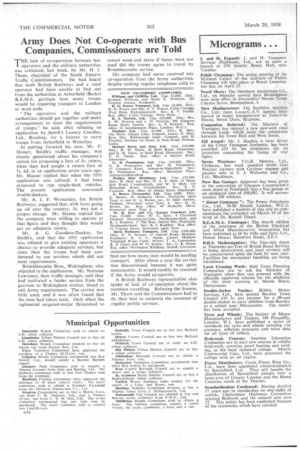Army Does Not Co-operate with Bus Companies, Commissioners are Told
Page 68

If you've noticed an error in this article please click here to report it so we can fix it.
THE lack of co-operation between bus operators and the military authorities was criticized, last week, by Mr. H. J. Thom, chairman of the South Eastern Traffic Commissioners. He had heard
that both British Railways and a road operator had been unable to find out from the authorities at Arborfield (Berks) R.E.M.E. garrison how many troops would be requiring transport to London at week-ends.
"The operators and the military authorities should get together and make arrangements to meet the requirements of troops," he said, after refusing an application by ,Smith's Luxury Coaches, Ltd., Reading, for a licence to carry troops from Arborfield to Waterloo.
In putting forward his case, Mr. F. Masser, Smith's traffic manager, was closely questioned about his company's reason for proposing a fare of 5s. return, when they had sought a return fare of 7s. 6d. in an application seven years ago.
Mr. Masser replied that when the 1951 application was refused, it had been proposed to run single-deck vehicles. The present application concerned double-deckers.
Mr_ A. J. F. Wrottesley, for British Railways, suggested that, with fares going up all over the country, 5s. was not a proper charge. Mr. Masser replied that the company were willing to operate at that figure and they thought they would get an adequate return.
Mr. A. G. Goodeve-Docker, for Smith's, said that the 1951 application was refused to give existing operators a chance to provide adequate services, but since then the troops had been condemned to use services which did not meet requirements, Brimblecombe Bros., Wokingham, also objected to the application. Mr. Norman Lawrence, their traffic manager, said they had instituted a feeder service from the garrison to Wokingham station, timed to suit Army requirements. The service was little used, and it was often found that the men had taken taxis. Only when the regimental sergeant-major threatened to cancel week-end leave if buses were not used did the troops agree to travel by Brimblecombe service.
His company had never received any co-operation from the Army authorities, despite making regular telephone calls to




















































































































